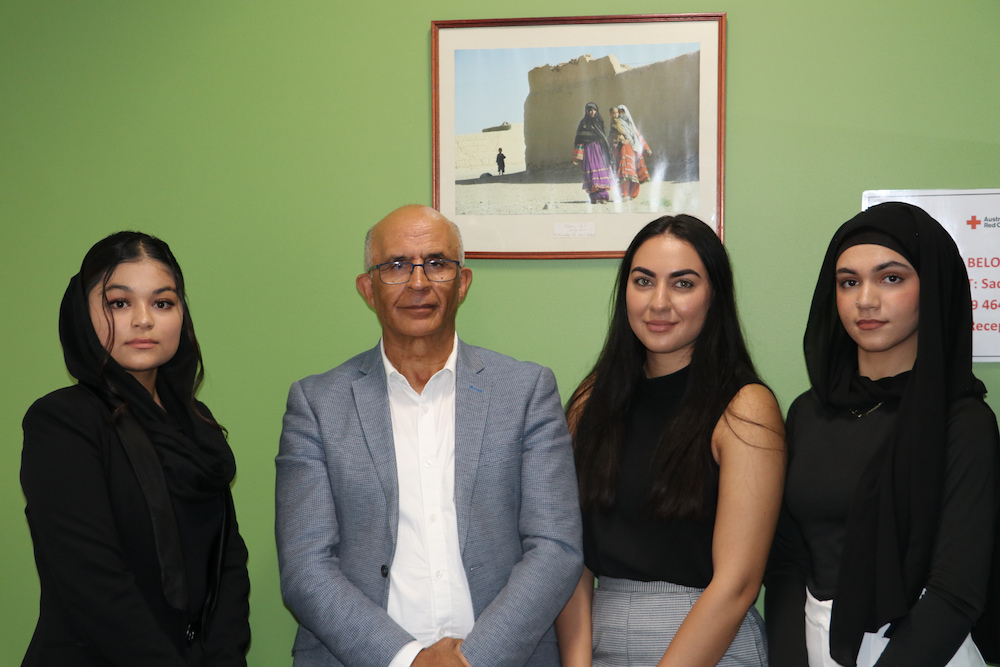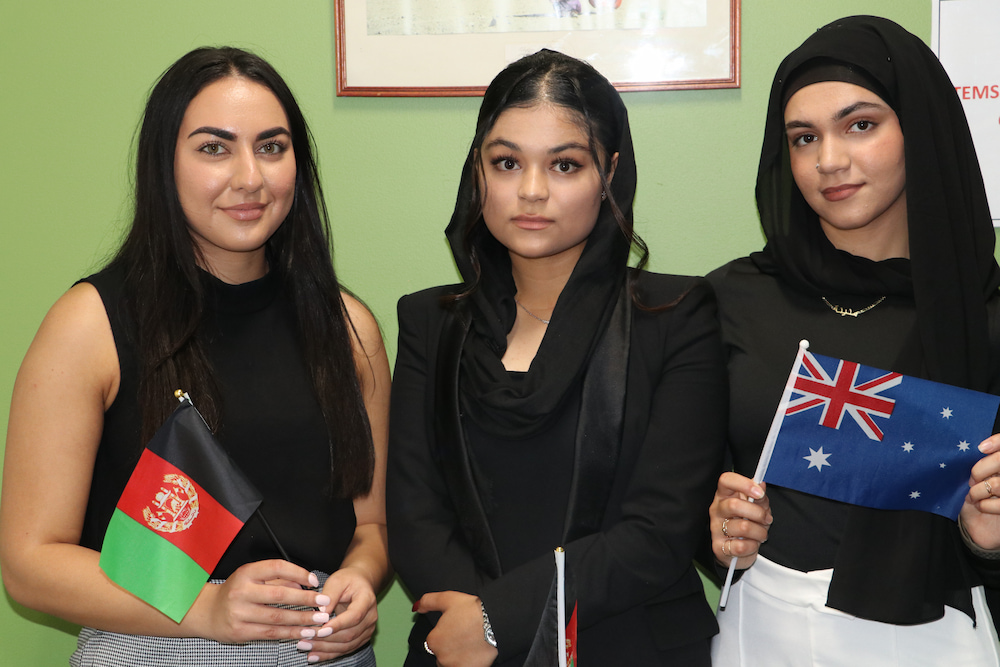Since the Taliban took power in Afghanistan in 2021, women’s rights there have gone backwards by 20 years, the United Nations says. Women cannot attend secondary school or tertiary education; they cannot leave their homes unaccompanied; and few can work. It is, the UN says, a gender apartheid, while Human Rights Watch has called the persecution of women and girls a crime against humanity. But in Canberra, Afghan-Australian women relish the chance to study and work, and they hope to change the world and improve the lot of their sisters in Afghanistan.
Canberra Daily spoke to three of them: Aamena Alizai, who graduated from the University of Canberra with a Bachelor of Politics and International Relations, and wants to be a diplomat; and Frishta Hussaini and Madina Lodin, who will both start law degrees at the University of Canberra this month.
They are among 11 Afghan-Australian students – six female and five male – who recently graduated from, or have been admitted to, university, and whose achievements were celebrated at an awards ceremony held by the Afghan Peace Foundation last month.
“Some of the students only arrived in Australia a few years ago, and barely spoke English when they first arrived, so entry into tertiary studies is particularly remarkable,” said Sonia Di Mezza, interim CEO of Migrant and Refugee Settlement Services, which hosted the event with Fair Canberra.
“The range of disciplines included law, medicine, international relations, and IT. Given that many young people in Afghanistan struggle to attend university, particularly women, the students were appreciative of the academic opportunities that they had accessed in Australia.”
“I would not have had those opportunities back in Afghanistan,” Madina said. “There’s no way that I could have reached the stage I’m at. I would probably now have been at home, washing dishes or doing some other house duty.”

Madina came to Australia in 2020. At that time, she had very limited English.
“I could just say ‘Hi’, ‘How are you?’, and stuff like that. I was very shy to speak.”
But she worked hard to study English and communicate with people. Her determination paid off; she received the MARSS scholarship, awarded to a student from a refugee background studying at Dickson College, and has achieved one of her biggest dreams: getting into law school.
“Never give up – there’s always a beginning,” is her attitude. “Never feel hopeless; never let your goals and dreams die; always work towards them.”
Whether as a judge or as a lawyer, she wants to show people in Afghanistan to value women, and that women can change the world.
“When I graduate, I really want to do something for my people, especially for the women who can’t study currently,” Madina said. “It makes me very, very sad. I finished my Year 10 in Afghanistan. When I came here, I saw the opportunity that girls and women have – but people in Afghanistan, especially women, don’t have it. Now the Taliban came, they can’t go to school; they are just sitting at home doing housework, which is not what they want. I have some friends who wish to go to university and finish college or a good degree, but they can’t. It’s very disappointing.”
Her friend Frishta arrived the year before, in 2019. It was hard to move to another country with new faces and different cultures and traditions, she reflects.
“For me, it was pretty hard to communicate; it was just like a shock to me.”
But she picked up English, and started communicating with people. Last year, at Dickson College, she created a human rights activist group, to talk about issues across the world and how to solve them. She and Madina also helped newly arrived students to learn how to speak English, communicate with people, and reach their goals. Now she is excited about going to university.
“In my head, I’m ready to smash the class, just go for it,” Frishta said.
She wants to become a human rights lawyer, “so then I can share my voice, and be a voice for the voiceless”. Like Madina, she wants to show people “who do not actually know what a woman means” the value of a woman, and how a woman can communicate, and create positive changes.
“I want women to be a part of the community, especially in Afghanistan,” Frishta said. “We and all of us in Canberra and Australia, we all want to make a positive change to provide opportunities for women to continue learning, education, and jobs.”
Now, Frishta says, she feels proud of herself; she overcame challenges in college and high school, with the support of her parents and family, and people in the community “who always have an eye out for the young generation”.
“Stay positive, stay strong, go out there, and do the best you can,” she encourages other Afghan girls arriving in Australia. “Get rid of those negative thoughts; create a positive life, a new life for yourself, and be the best out there.”
Aamena’s story is different: born in Germany, she came to Canberra when she was four years old.
“I’ve never been to Afghanistan … but even though I haven’t been, I’m still a child of two migrant parents who did so much for me and my brother to be able to get to where we are now. And for that, I am so appreciative, because it made me realise how much I want to do more with my life and how I want to do further studies.”
Ever since Year 10, she has wanted to be a diplomat, helping the West strengthen its political, economic, and diplomatic ties with other countries, and work in the Department of Foreign Affairs and Trade (DFAT) or the Australian Signals Directorate.
“If there were a lot of measures put into place, I feel like we could make Afghanistan a thriving place for not only women, but young children, boys, girls, men, everyone, to flourish and really excel in what they choose to do with their life, in terms of career aspirations and higher education. Unfortunately, there is a bit of a barrier and a difficulty in doing that at the moment. I feel like there needs to be that push from the West to help put those measures in place. But that is only dependent on those diplomatic ties…”
Having graduated from UC, she has applied to do a master’s degree in European studies and public administration. If she is accepted, she will move to Germany for a year and a half.
“Having all of those sacrifices allowed me to get to where I am today,” Aamena said. “If I didn’t have that drive, or that passion, or that support from my family, I wouldn’t have been able to achieve that…
“You can do whatever you want here, in terms of career and education,” she advises other young Afghan women. “The world is your oyster. Honestly, whatever your hopes and dreams are, you can definitely achieve that here. You can connect with the right people, like-minded people, or even find people that have completely different career aspirations to you, and connect with them. Find what you like, what you don’t like, and really build on that; just go out there and do more.”
She loved every moment of university, she says. “When I finished last year, I didn’t realise how much I would miss studying and going to tutorials and lectures, and having the opportunity to sit with like-minded people and have discussions about topics that we were all interested in and held a lot of passion for, and in an environment that you weren’t judged and you’re allowed to speak your mind and also be challenged…
“When I hear the stories of how women aren’t allowed to pursue further education or higher education, it makes me really disappointed that they’re not able to follow and chase their dreams, and … broaden their knowledge… It definitely makes you appreciate what you have here and everything that we get provided here, like access to education, higher education, and the jobs and careers that can follow afterwards.”
“These people are young; they’re the ones who are going to bring some changes,” said Dr Nadir Saikal, the Afghan Peace Foundation’s state director Canberra.

“Hopefully, we can do much better. Women’s issues are very important for us at the moment, because women on the street of Kabul are kidnapped daily by the terrorist régime of the Taliban. It is just not acceptable by any circumstances.”
Over the last couple of years, Canberra’s Afghan population has grown to a couple of thousand, as refugees seek a new home.
But 40 million people are still living in terror, Dr Saikal says. When the West withdrew after 20 years, Afghanistan collapsed; now, it is in the hands of the Taliban.
“It is very tragic, very sad. With no education, they have come from the madrassahs – and they don’t know how to run the country… We ask the Australian government to do something, to take action…”



